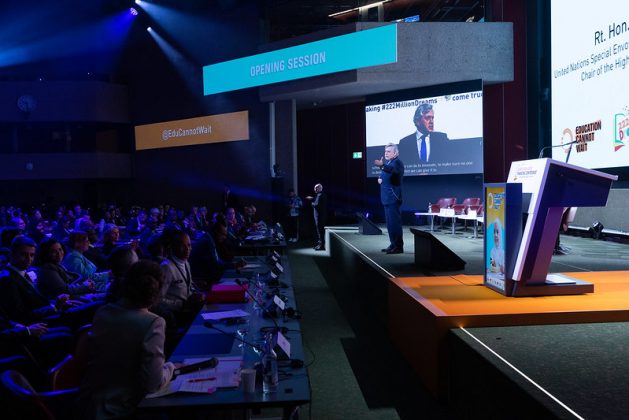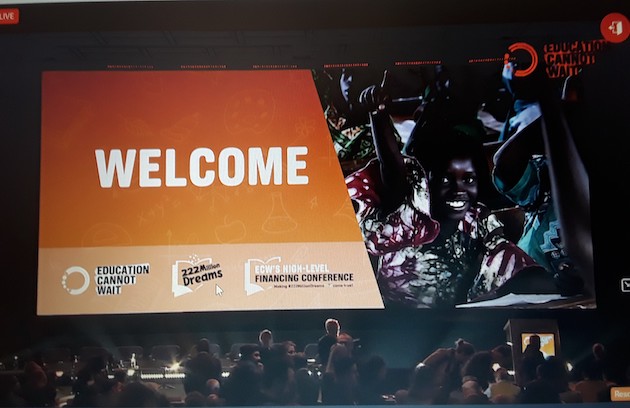ECW High-Level Financing Conference Raises More than 826 Million USD to Keep Crisis-Impacted Children in School

GENEVA & NAIROBI, Feb 16 (IPS) - As an unparalleled, unprecedented global education crisis unfolds, an estimated 222 million crisis-impacted children are desperate to learn. As barriers to accessing education increase, darkness beckons, and education is their last hope.
“The children of Syria and Turkey today are in addition to the 222 million children around the world in every single continent who are displaced. An estimated 78 million will not go to school today or any other day, and 140 million children whose education has been so disrupted and so traumatized that they are not able to read and write by the age of 11,” Gordon Brown, United Nations Special Envoy for Global Education, Chair of the High-Level Steering Group.
He asked the delegates at the conference to stand in support of the children from the two countries impacted by a devastating earthquake that has killed more than 41 000 people and displaced tens of thousands.
Brown stressed the need to speak up for children in Afghanistan, Chad, Ethiopia, Yemen, Ukraine, and many more, for they are the most neglected, forgotten, and isolated, and they need and deserve support. Brown was speaking during the opening session of the first Education Cannot Wait (ECW) high-level financing conference underway in Geneva, Switzerland.

The conference was organized in close collaboration with the governments of Colombia, Germany, Niger, Norway, South Sudan, and Switzerland to deliver the promise of an education for all children affected by crises.
ECW, the UN global fund for education in emergencies and protracted crises, continues to marshal much-needed support for crisis-impacted children. But as conflict and disaster mount pressure on economies, education systems, and international assistance, funding is always stretched.
“This financing conference represents a promise to the boys and girls of the world. No matter who you are, no matter where you live, and no matter what barriers stand in the way, you have the right to a quality education. Education Cannot Wait is a lifeline for these young learners,” UN Secretary-General António Guterres.
“With your generous new commitments, we can deliver education to an additional 20 million children and transform the various humanitarian nightmares into bright new hope for the future. Let’s keep our promise to the girls and boys of the world. Let’s keep their dreams alive.”
Yasmine Sherif, the ECW's director, said in 2016 when ECW was founded, there were 75 million children in need of education support. The number has since increased to approximately 222 million children, and adolescents and counting as additional crisis situations emerge, such as those in Syria and Turkey.
Syria now needs an additional USD 39 million due to the earthquake. ECW has already announced USD 7 million as a First Emergency Response Grant in Syria that will provide children impacted by the quake with life-saving access to education, Sherif said.
“But funding is not marching the growing need around the world. Education Cannot Wait, and resources cannot wait for 222 million dreams. It takes a great idea and a great mind, and then the rest of us make it happen.”
Speaking to more than 2,000 online participants and 600 in-person attendees, Sherif said the High-Level Financing Conference seeks to mobilize at least USD 1.5 billion to actualize the ambitious 2023-2026 Strategic Plan, to reach at least 20 million boys and girls with education support in the next four years.
A few hours into the conference, Sherif announced that in excess of USD 826 million had been raised and that the five top donors include Germany, the United Kingdom, Norway, the United States, and Denmark. She further expressed confidence that as an understanding of what is at stake increases, ECW and its strategic partners will reach USD 5 billion at the end of the four-year strategic plan.
Ignazio Cassis, Federal Councilor and Head of the Federal Department of Foreign Affairs, Switzerland, said that Switzerland would remain a strong global humanitarian capital and center for education in emergencies.
He noted that while Switzerland is a notable prosperous country, it was not always the case and that the magic formula was in a central role given to education in government policies since the emergence of modern Switzerland 175 years ago.
“This past Thursday, some 900,000 boys and girls across Switzerland went to school in safety as part of their compulsory education. On this same Thursday, 222 million children affected by crises around the world have not been so lucky. Switzerland appeals to world leaders to make the education of these children a top priority. We need to be able to count on a well-educated future generation; the peace, freedom, and prosperity of all nations depend on it,” Cassis expounded.
ECW was applauded for enduring and staying on the ground even as the conflict became a protracted crisis. In Afghanistan, for instance, Sherif says ECW has invested more thanUSD 70 million since 2017 through community-based schooling and that 58 percent of those receiving that education are girls.
Catherine Russell, Executive Director of UNICEF, said that there is an even greater need to keep working together, creating a movement, moving forward and upward for 222 million dreams depend on this unity. She particularly stressed UNICEF’s deep commitment to ensuring that every child, everywhere, has access to education.
“When children in crisis-affected countries have access to education, they also have access to a range of services that support their well-being like psychosocial support, social interaction, essential public safety information, and in many cases, a nutritious meal and clean water. And, of course, education provides children, whether living in emergency contexts or not, with the foundational learning tools to survive and thrive as adults,” she said.
Founded in 2016, ECW supports the implementation of the largest education emergency program globally and has already raised over USD 1.1 billion from donors, the private sector, and philanthropic foundations and reached close to 7 million children and adolescents with holistic education supports.
IPS UN Bureau Report
Follow @IPSNewsUNBureau
Follow IPS News UN Bureau on Instagram
© Inter Press Service (2023) — All Rights Reserved. Original source: Inter Press Service
 Global Issues
Global Issues